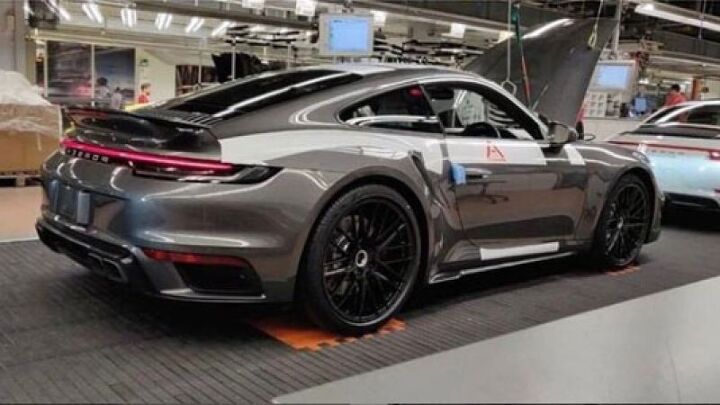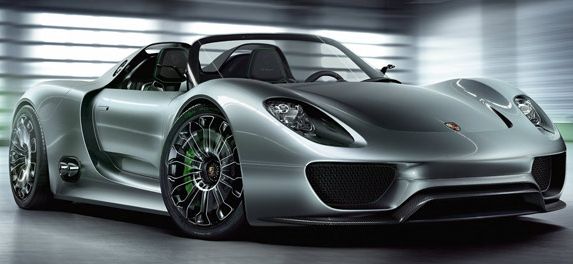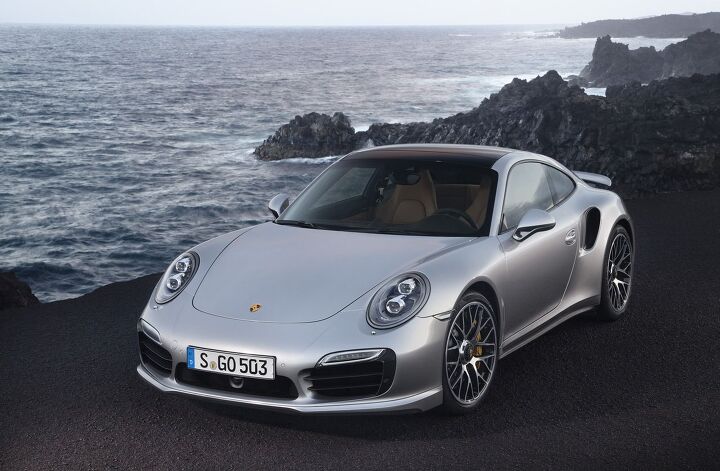#Porsche911Turbo
2020 Porsche 911 Turbo Leaked?
With the eighth-generation Porsche 911 having made its debut at the 2018 Los Angeles Auto Show, we anticipated waiting months for the automaker to start rolling the high-horsepower variants. Up until now, we’ve seen the Carrara S, 4S, and their convertible counterparts. But we didn’t expect to see the 992 Turbo until the fall.
However, it appears that one Porsche enthusiast managed snag a candid photograph of the Turbo without the manufacturer’s knowledge, spreading the image all over the internet.
Porsche 911 Turbo S Too Slow For You? 911 Turbo S Exclusive Series Turns Up The Wick
Let’s stop beating around the bush. The Porsche 911 Turbo S is slow.
At first, the upgrade from a proletarian, 370-horsepower 911 to the 540-horsepower 911 Turbo sounds momentous. But, pfft. Puh-leeze.
The 911 Turbo S should therefore be the answer. 570 horsepower. Nought to 60 in 2.9 seconds. 205 miles per hour.
But I remain unimpressed. You remain indifferent. The Porsche 911 Turbo S is found wanting.
Porsche recognizes this. Porsche has heard our demanding cries for a genuinely fast car. This is the Porsche 911 Turbo S Exclusive Series. It is very exclusive, very expensive, and finally, the 911 Turbo S is sufficiently quick.
Alright, NOW How Much Would You Pay?
Someday, in that distant future, when I finally get around to publishing my book, there is a strong chance I’m going to open it with a list of all the ways in which I have abused my 1995 Porsche 911 Carrera. Not in the modern douchebag-showoff sense of driving a Huracan in the snow or driving an Aventador in the snow or driving any other Lamborghini in the snow for a YouTube video only to have the thing fastidiously concours-detailed the minute the GoPros stop rolling. More like in the sense of just using it as a regular car for 60,000 or so miles. Driving it in the rain, the hail, the 100-degree Midwestern summer heat. Leaving it outside random girls’ houses in every kind of neighborhood imaginable, overnight. Using it to carry tires and oil drain pans and children. I’ve watched my son ride his bicycle directly into the thing and shrugged it off. I’ve dropped the clutch at 5,000 rpm, hundreds of times.
Porsche Publishes Novella With Official 918 Data & 911 50th Anniversary Celebration
Porsche has released the final, official data on their hybrid supercar, the 918, developed alongside of the car the the company will be racing at LeMans in 2014. The 11,000 word press release has everything you could possibly want to know about the 918, plus the new 911 Turbo as well as the rest of Porsche’s presence at the Frankfurt show, which focuses on the 50th anniversary of the 911. The 918 is powered by a 4.6 liter V8 gasoline fired ICE, dry sumped and mounted behind the cockpit, that puts out 608 hp, along with three electric motors that combined produce 286 hp, giving the driver up to 887 horsepower at his or her discretion (there is, apparently, a loss of 7 hp somewhere in full power mode). Performance is rated at 2.8 seconds for 0-100 kmh (0-62 mph) and 0-200 kmh in only 7.7 seconds. The 918 is a plug in hybrid, with a recharging time for the 7 kw/h lithium-ion battery of 4 hours on Germany’s 230 volt AC mains. Fast DC charging is said to take 25 minutes. If you want to, you can even get a speeding ticket while retaining green cred, top speed on electric power alone is 93 mph. Electric-only range, though, is limited to 10 to 20 miles per charge. Porsche is claiming 85 to 94 miles per gallon, but that probably isn’t when doing 0-62 kmh runs.




















Recent Comments